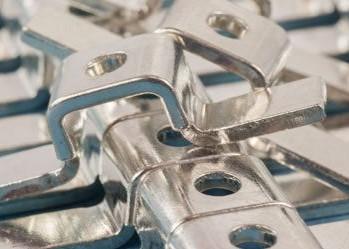
Electroplating specialist EC Williams is one of six companies participating in a Government funded project to recover gallium from used LED lights.
The nine-month project, which began on 1 November, is titled Recovery of Gallium Ionic Liquid (ReGAIL) and is partly financed by Innovate UK.
Williams will be studying opportunities for recovering gallium metal from LED lights. Gallium is usually only recovered from offcuts and shavings, and this is the first time the high-performance semiconductor will be recovered from end-of-life components.
The LED lights will come from WEEE (Waste Electrical and Electronic Equipment). There is currently no recovery for gallium when LED lamps are being recycled, and this project is hoping to determine a method that will hopefully reduce the need for extracting raw gallium and create a circular supply chain from the recovered waste gallium.
Used in a wide range of applications, gallium is a metal element which has the widest liquid element temperature range than any other element. Although it is not known as a precious metal element, it has a reasonably high value of approximately £2,500 per tonne - however this fluctuates. The EU classifies the element as a Critical Raw Material, and its largest producer is China (attributing to around 80% of it). Used in lasers, solar cells, Radio Frequency amplifiers, wireless chargers, and light detection systems, gallium is very versatile and is predicted to be in increasing demand over the next decade as the use of electrical vehicles rises. This is as a result of the fact that it will be used in Power, Electronics and Machine Drives. One of its most common uses is in LED lamps, which currently account for around 2% of the tonnage of UK waste lamps.
Whilst LED lamps are currently only making a small percentage of lamp wastage, the timing of this new project is perfect. Put simply, it is providing the opportunity to create a sustainable solution for waste gallium before LEDs begin to take up large quantities of waste. Due to its low heat loss properties and smaller space requirements, gallium is very likely to replace silicon in the future when it comes to power system semiconductors. With this in mind, identifying ways to capture the element through recycling processes will reduce the need for raw extraction, and therefore increase the country’s supply chain efficiency. A viable solution will also decrease the chances of the UK needing to import gallium from abroad in the future.
The company said: “EC Williams Ltd is delighted to be working alongside five other reputable companies on research that could truly create a more renewable, cost-effective, and environmentally-friendly process for the future of gallium extraction and the recycling of LED lamps. As a consortium of companies, we are prepared for the challenges that may be faced over the next 9 months of studies, however we are confident that we will establish success.”